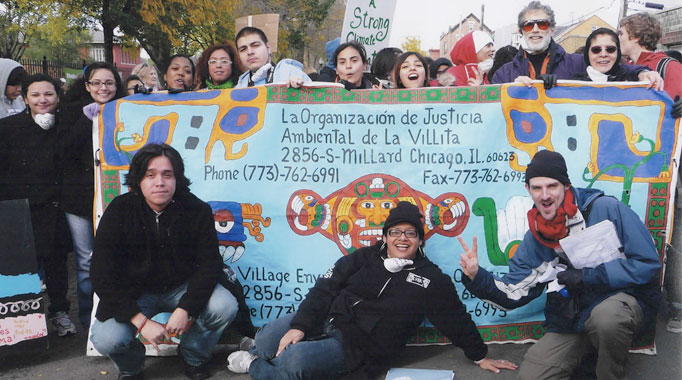History

LVEJO was founded in 1994 by public school parents who learned about the potential exposure of their children to dangerous particles during school renovations at Joseph E. Gary Elementary. After forcing the school administration to change their plans, these parents turned their attention to other issues of environmental justice in Little Village.
Under the leadership of the organization’s first Executive Director, Victor Ceballos, LVEJO worked with neighborhood youth on local campaigns against polluting factories. LVEJO soon developed a campaign to remediate the Celotex superfund site and developed a strong youth leadership development program. With an organized youth base LVEJO conducted important surveys and maps of the neighborhood to understand the environmental problems that the community needed to address. Through this grassroots process, LVEJO identified the Crawford Coal Power Plant, Celotex, and the 31st CTA bus line as important environmental justice struggles.
In 2005 LVEJO’s community organizer Kim Wasserman-Nieto became the Executive Director, a position she would hold for eight years. Working alongside courageous community leaders, Wasserman and LVEJO’s organizers waged tireless grassroots campaigns to close down the Crawford and Fisk coal power plants, to remediate and convert the Celotex site into a new public park, and to permanently re-establish the 31st bus route in the neighborhood. LVEJO also formed strong alliances with other environmental and social justice organizations through the Clean Power Coalition.
Led by LVEJO and PERRO, another environmental justice group in Pilsen, the Clean Power Coalition was successful in retiring the Crawford and Fisk plants in 2012. This tremendous community victory represented a resounding example of community power and the necessity of community organizing. For her exemplary leadership and commitment Kim Wasserman-Nieto was awarded the prestigious Goldman Environmental Prize in April of 2013.
In 2013, LVEJO also won the Celotex superfund campaign and worked with the Chicago Park District to design the first public park to be built in Little Village in 75 years. To be opened in December of 2014, the new park will be named La Villita Park and will address the great need for open space in the community. In October of 2013 LVEJO’s long-standing campaign to re-establish the 31st bus route was also completed, ensuring that the neighborhood has adequate transit access for the first time in years.
After twenty years working for environmental justice in Little Village, LVEJO continues to organize for a healthier community in Little Village and beyond. Building upon the successful clean power, public transit, and open space campaigns LVEJO remains committed to organizing with those most impacted by industrialization and climate change.
Gary School Environmental Justice Project Founded
June , 1994

Won the cleanup of Winter Metals, a local metal smelter. The site was shut down, declared a superfund site and remediated.
July , 1998
Waste Management Inc. to install $1 Million in Pollution Controls & reduce garbage intake at the Waste Transfer Station on 33rd & Lawndale.
September , 1999
Successfully applied pressure to Honeywell Corp. to clean up the harmful toxins from the abandoned Celotex asphalt factory, where over 175 families reside.
September , 2006
Won the remediation of the Troy Street Garden Site.
September , 2010

As part of the Clean Power Coalition forced the closure of the two Coal Power Plants in Chicago.
February , 2012

Successfully organized for the 31st Street Bus Extension
September , 2012

Kim Wasserman Wins Goldman Prize
April , 2013

Broke Ground on the Troy Street Garden
June , 2013

Construction on Park #553, the former Celotex Superfund Site, begins
December , 2013

Environmental Justice Executive Order 12898 20th Anniversary
February , 2014

LVEJO 20th Anniversary
Grand Opening of La Villita Park
December , 2014
LVEJO’s 3rd Annual: – Roots of Change- Youth Summit
April , 2015

